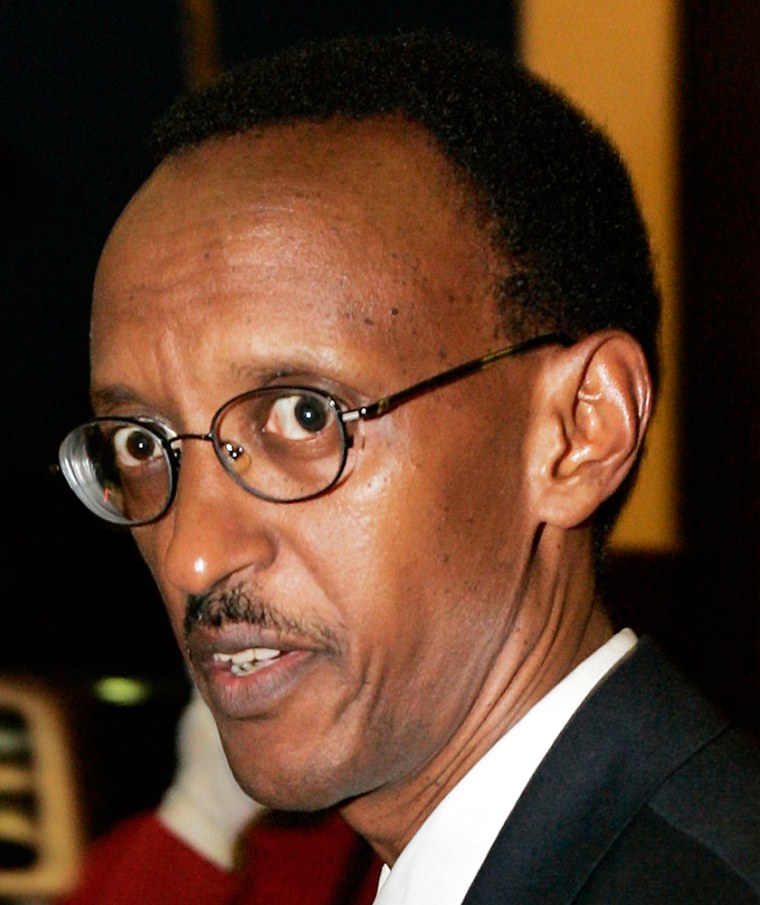U.N. air and ground patrols have photographed freshly made encampments and unidentified well-equipped troops in east Congo, U.N. officials said Thursday, bolstering suspicions — still unconfirmed — that Rwanda is making good on its threat to send troops into its larger, weaker neighbor.
“We have more and more corroborating signs tending to establish the presence of Rwandan troops in Congo,” the U.N. mission in Congo spokesman Mamadou Bah said. Those signs include aerial photographs of camps and of troops in new vehicles in east Congo.
The U.N. reports of suspicious activity, following U.N. observers’ encounter with what they believed to be 100 Rwandan troops on Tuesday at a town a few miles inside Congo, come after a week of Rwandan warnings it would send forces into Congo in pursuit of Rwandan Hutu rebels sheltering in Congo’s lawless east.
U.N. officials say they have yet to conclusively determine a Rwandan troop presence in Congo — a finding that would confirm a Rwanda violation of central African peace accords and leave the international community the difficult decision of how to react.
In the Rwandan capital, Kigali, Rwandan regional envoy Richard Sezibera denied that Rwandan troops have entered Congo — but said Rwanda reserved the right to if U.N. and Congo forces fail to disarm Rwandan Hutu rebels there.
“All reported sightings of Rwandan troops in the Congo are false,” Sezibera told a news conference in Kigali. “Rwanda doesn’t want to enter the Congo, and that’s why we are calling on the international community and the Congo to help Rwanda not have to enter the Congo.”
Rain on Thursday grounded reconnaissance missions, and U.N. officials had yet to verify whether the 100 forces were Rwandan, spokeswoman Patricia Tome said in Kinshasa.
Central Africa’s devastating five-year, six-nation war in Congo started with a 1998 invasion by Rwanda in pursuit of the Rwandan rebels.
Besides Rwandan rebels, numerous armed groups operate in hilly, forested east Congo, where troops of a more than 11,000-strong U.N. force are helping Congo’s government try to establish control of the long neglected region.
Rwanda’s revived threats — coming as Congo and U.N. peacekeepers step up their own efforts to disarm the rebels and other armed groups in east Congo — have raised fears of a reignition of the conflict in Africa’s third-largest nation.
Rwandan President Paul Kagame, in a Nov. 25 letter circulated among diplomats and journalists in Kinshasa, formally advised African and U.N. leaders that Rwanda intended action within Congo against the rebels.
Kagame said he believed Rwandan troops would return to their own country within 14 days, he wrote. He cited what he called “an unacceptable and urgent threat to Rwanda” from what he said were intensified rebel actions in Congo.
The United Nations has said it has found no evidence of any new cross-border attacks by Rwandan rebels in Congo, contrary to allegations by Congo.
The many armed bands in east Congo include Rwandan Hutu rebels who fled to eastern Congo to escape retribution for the 1994 Hutu extremist massacre of more than a half-million minority Tutsi and moderate Hutus in Rwanda.
Rwanda invaded Congo twice in pursuit of the rebels, in 1996 and in 1998. Peace deals forced out the foreign armies by 2002, and a power-sharing government is meant to lead the country to elections in 2005.
Congo says Rwanda itself failed to eliminate the Rwanda Hutu rebels when it controlled east Congo during the 1998-2002 war, and accuses Rwanda of seeking excuses to reoccupy Congo’s resource-rich east.
